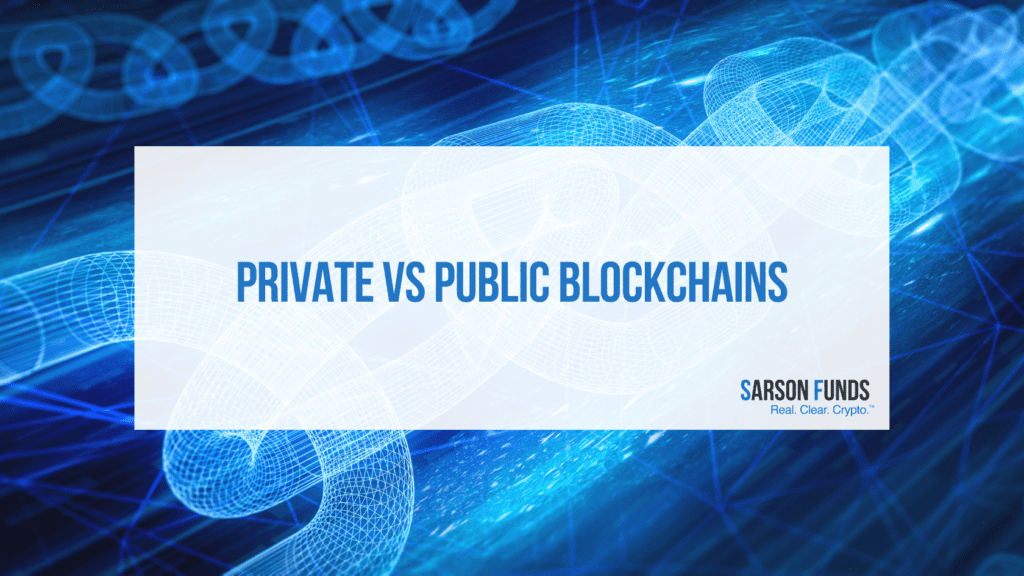
By, John Sarson CEO Sarson Funds, Inc.
Blockchains, also known as distributed ledgers, have been a subject of intense interest for their transformative potential within business applications. Essentially, there are two primary types of blockchains: public and private, each having its unique advantages, and disadvantages relevant to different enterprise and industry needs. This article will explore when to use a public or private blockchain and give examples of how and when they need to interact with each other.
Public Blockchains:
Public blockchains, also referred to as permissionless blockchains, are open to anyone who wants to participate. They are decentralized, without a singular authority, ensuring a high degree of transparency, integrity, and reliability. Bitcoin, Ethereum, Solana, Casper and even Cardano, are all examples of “permissionless” public blockchains. For businesses, the main advantage of public blockchains is their recognized security and data integrity. Parties to transactions on public blockchains do not have to trust each other but can rely on the integrity of the blockchain. This has significant potential in fields such as supply chain management and inter-business transactions, where provenance and traceability of assets can be streamlined and enhanced.
However, public blockchains do come with some disadvantages. The open nature of these networks may not be suitable for businesses needing to keep some information confidential. For example, Broadridge Financial, a mega back-office solution for recording and settling stock trades, estimates that utilizing blockchain technology can streamline settlement processes that currently takes 12+ legacy check and balance transactions into something more accurate and dramatically faster. Broadridge estimates using a blockchain could save between $9 – $11 Billion dollars annually in operational efficiency. This transaction data, of course, would require privacy and would be recorded only on a private blockchain, or possibly a series of redundant blockchains, all controlled by Broadridge.
Private Blockchains:
Private blockchains, also known as permissioned blockchains, can limit participation to approved entities only, and governance is usually by a single organization or consortium. Currently the most widely deployed use of blockchains for business is based off the open-source project Hyperledger Fabric. It currently counts more than 120 thousand organizations worldwide as users.
According to IBM’s website, Hyperledger Fabric is a joint initiative sponsored by IBM, Intel, and SAP Ariba. This private blockchain is a, proven, enterprise-grade, distributed ledger platform that offers a unique approach to consensus that enables performance at scale while preserving data privacy and allowing for customized regulatory solutions that enterprises require.
However, a private blockchain’s centralization may lead to trust concerns, as the control over consensus and governance is held by one entity. The benefits of decentralization, like immunity to censorship and manipulation, are generally not present in private blockchains.
Private and Public Blockchains:
It was in Davos in 2022 at the Casper Innovation Hub that I finally understood how (and why) private and public blockchains will work together. Casper Association, the decentralized team behind the Casper blockchain, had already been working closely with IBM on “atomic swaps” that is the secure migration of data stored on one blockchain (public or private) to another and IBM came to Davos to demo this feature.
In their example, they used the hypothetical sale of a bond from a company running Hyperledger. The private blockchain was used to record the data internally for the company issuing the bond, but the need to issue the buyer of the bond a certificate or token that would represent the bond buyer’s investment was not solved. The issuance of this purchase receipt would need to happen on a public blockchain because only a public blockchain could ensure that the transaction history could not be changed by either party and that the blockchain’s existence would not become an issue should the controlling company fail or otherwise choose to stop supporting the database.
Financial transactions with need proof of their investment/purchase/title recorded on a database that is both immutable and durable such as a public blockchain. Companies using private blockchains need to have a plan for interacting with public blockchains for their public facing transactions and those transactions need to sync in real time with the company’s internal records.
As a business blockchains-solutions company, Casper Labs is leading the industry in working with IBM and many other large enterprises that need a solution for private/public blockchain integration – with development support.
The choice between public and private blockchains for business applications hinges on the specific requirements of the enterprise or industry in question but in many cases, the answer will be using both. Businesses need to balance their needs for transparency, trust, privacy, control, and regulatory compliance when making this decision. While public blockchains offer trustless interactions and transparency, private blockchains provide efficiency, privacy, and control. The choice is not binary, and hybrid solutions combining features of both may also be worth exploring in some cases. Some of the largest public blockchains, such as Bitcoin and Ethereum, lack the necessary technical support teams desired by non-crypto native firms. This has created fertile ground for B2B sales of enterprise-focused public blockchains like Casper and others.
Disclosures: Not investment advice. It should be assumed that Sarson Funds or its affiliated managers hold positions in all projects that are discussed. It is not possible to invest in any project directly through Sarson Funds, Inc. or its affiliated managers. Any investment product offered by managers affiliated with Sarson Funds should be assumed to be only available to Accredited Investors and subject to the individual terms and conditions of that offering including but not limited to those eligibility requirements associated with U.S. Securities Regulation D, section 506c. Talk with your financial advisor before making any investment decisions or have them contact Sarson Funds directly at [email protected].








